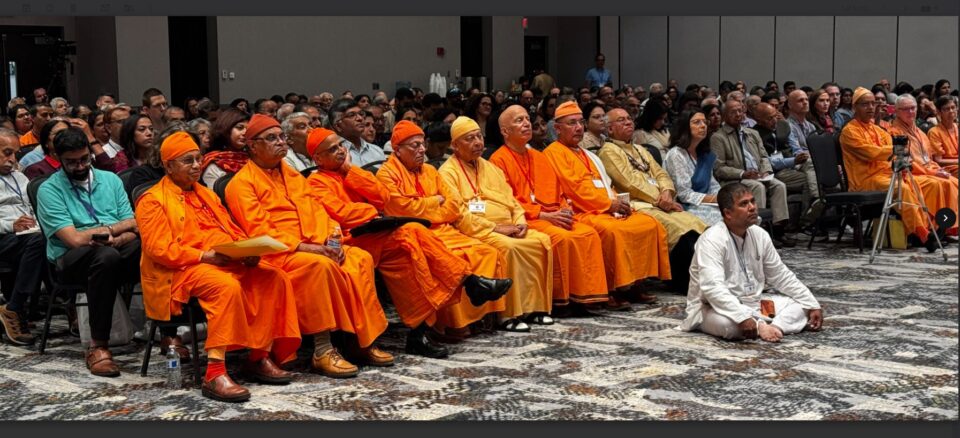BY RAVI R PONANGI
WITH INPUTS BY PUDIPEDDI SESHU SARMA
Huntsville, Alabama, September 19, 2025: Not only the first ever, but also unique, The North America Vedanta Conference (NAVC) was a monumental event, marking a significant milestone in the exploration of Vedanta philosophy across North America. Held from September 12 through 14 in Huntsville, Alabama, at the Von Braun Center, this conference wasn’t just a gathering—it was an enriching experience that bridged ancient wisdom with modern-day relevance. It featured four distinct schools of Vedanta, with 16 revered speakers from institutions like the Ramakrishna Order and the Chinmaya Mission.
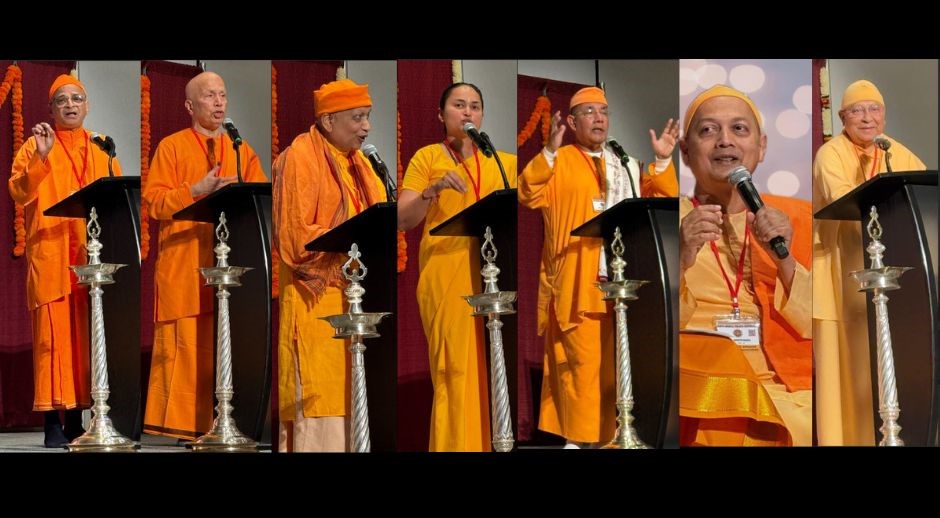
Speakers include Swami Sarvadevananda, Head, Vedanta Society of Southern of California; Swami Prapannananda, Head, Vedanta Society of Sacramento; Swami Ishatmananda, Head, Vivekananda Vedanta Society of Chicago; Swami Ishtananda, Head, Vedanta Center of St. Petersburg, Florida; Swami Yogatmananda, Head, Vedanta Society of Providence; Swami Tyagananda, Head, Ramakrishna Vedanta Society, Boston; Swami Kripamayananda, Head, Vedanta Society of Toronto; Swami Tattwamayananda, Head, Vedanta Society of Northern California; Swami Prasannatmananda, Head, Vedanta Society of Berkeley; Swami Chandrashekharananda, Head, Vedanta Society of Portland; Swami Satyamayananda, Head, Vedanta Society of Western Washington; Swami Sarvapriyananda, Head, Vedanta Society of New York; Pravrajika Brahmaprana, Ramakrishna Vedanta Society of North Texas; Pravrajika Vrajaprana, Sarada Convent, Vedanta Society of Southern California; Pravrajika Virajaprana, Vedanta Convent, Vedanta Society of San Francisco; Brahmacharini Jyoti Chaitanya, Chinmaya Mission, Atlanta, Georgia.
Hindu Cultural Center of North Alabama hosted 3-day North America Vedanta Conference. Under the guidance of Pujya Swami Ishatmananda Ji, Dr. Subir Paul, Conference committee convener and dedicated volunteers of NAVC 2025 did a wonderful and commendable job for the success of the conference. 3 Days, 4 Vedanta Principles, 5 Sessions, 16 Revered Speakers, 400+ attendees- a tall order by any standards.

The North America Vedanta Conference (NAVC) was an incredible event, bringing together scholars, devotees, and seekers to dive into the depths of Vedantic philosophy. The atmosphere was both reflective and enriching, allowing participants to explore the teachings of Vedanta in a practical and spiritual context.
The Vedanta tradition has a rich history and philosophy. The four schools of Vedanta—Advaita, Vishishtadvaita, Dvaita, and Samanvaya Vedanta—were explored in-depth, with historical, lives of persons who advocated different schools of Vedanta and philosophical perspectives guiding the discussions. The focus on understanding the nature of reality, the self, and Brahman from different viewpoints must have been fascinating. The inclusion of revered speakers from across North America, especially those from the Ramakrishna Order and Chinmaya Mission, surely added an authoritative and deeply spiritual element to the conference. Emphasized on the existence of harmonious Divine Oneness of truth, and render spiritual guidance for peace & happiness and thus join a journey towards Spiritual Unity and Blissful Divinity. Revered Swami Ishatmananda Ji presented devotional stotra recitals and prayerful meditation throughout the conference.
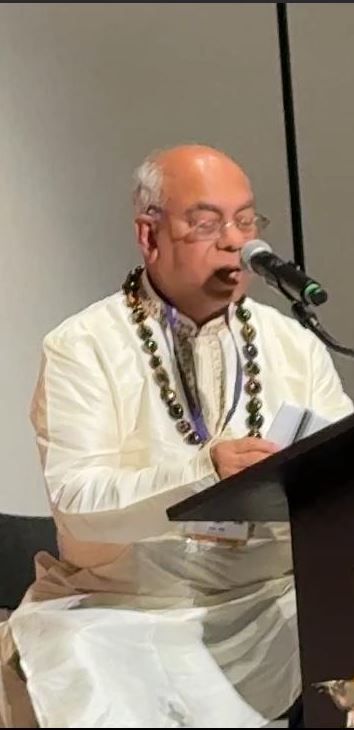
Vedanta is Upanishad Pramana. Upanishads, Bhagavadgita and Brahma sutras are main source for Vedanta. Commentaries on Upanishads, Bhagavadgita and Brahma sutras over thousands of years generated multiple schools of Vedanta namely Advaita (Non-dualism), Vishishtadvaita (Qualified Non-dualism), Dvaita (Dualism) & Samanvaya Vedanta (Synthesis of Knowledge) and continues till today. These are living tradition and core value to Hinduism. These traditions developed through millions of years. The conference covered 5 topics namely Dvaita Vedanta, Vishishtadvaita Vedanta, Advaita Vedanta, Samanvaya Vedanta and Vedanta in Daily Life.
Following the inauguration ceremony on Friday, September 12th, Swami Sarvapriyananda, the resident Acharya of the Vedanta Society of New York, gave a brief introduction on the basic Vedantic principles and its major divisions. The first session was dedicated to Dvaita Vedanta and discussions centered around the dualistic Vedanta practices prior to, during and post Chaitanya Mahaprabhu period. The contributions of Madhvacharya, Jayateertha, Vyasa Teertha, Purandara Dasa and many more were elaborated.
The 2nd day, Saturday, September 13th, was divided into 3 sessions. The first session was dedicated to Vishishtadvaita and the Acharyas covered Vishishtadvaita, before, during and after Ramanujacharya’s period. The practices of the Alwars, Nayanars, Andal, Natha Muni and Yamunacharya, prior to Ramanujacharya’s exposition on the Vishishtadvaita philosophy in Sribhasyam were stressed. Subsequently, a discussion of the theological and sectarian schism that took place after Ramanuja’s period ensued. Contributions by Vedanta Desika, and others during the post-Ramanuja period were covered.
Advaita Vedanta prior to, during and after Sankara’s life were discussed in the 2nd session, though Advaita philosophy was practiced since the inception of the Vedas, the Acharyas said. Mention was made of the pre-Shankara advaitins such as Atreya, Katyayani, Sundara Pandya, Brahmadatta, Barthruhari and others. Adi Shankara’s Advaita philosophy and post Shankara’s advaitins like Ramakrishna, Vivekananda and others were discussed in detail. A dedicated segment on women Advaitins namely Gargi and Vagdevi were a prominent feature of the conference something not always emphasized in historical discussions. The last session of the day was on the Samanvaya Vedanta, which encompasses harmony and unity in the diversity of different types of Vedanta, as practiced by Ramakrishna Paramahamsa and Swami Vivekananda.
On the last day, a special session was dedicated to Vedanta in Modern Life with emphasis on how modern men and women can practice Vedantic philosophy in their day-to-day lives. Swami Sarvapriyananda moderated all the sessions except the one on Samanvaya Vedanta which was done by Swami Tyagananda of the Vedanta Society of Boston.
The unique approach of having each session focus on specific personalities, like Chaitanya Mahaprabhu or Ramanuja or Madhvacharya, to illustrate the nuances of different schools of Vedanta. This provided a holistic understanding for attendees, tying philosophical teachings with the lived examples of spiritual masters. The overall emphasis on personal spiritual realization, enlightenment, and liberation is such a valuable takeaway. The 2025 NAVC didn’t just aim to educate intellectually but to inspire attendees on a deeper spiritual journey.
Swami Ishatmananda Ji said it is heartening to see that devotees from different cities and even countries, like India, come together to support and advance the mission of Vedanta. This collective spirit of helping hands, shows the strength of community and shared purpose in spiritual practice.
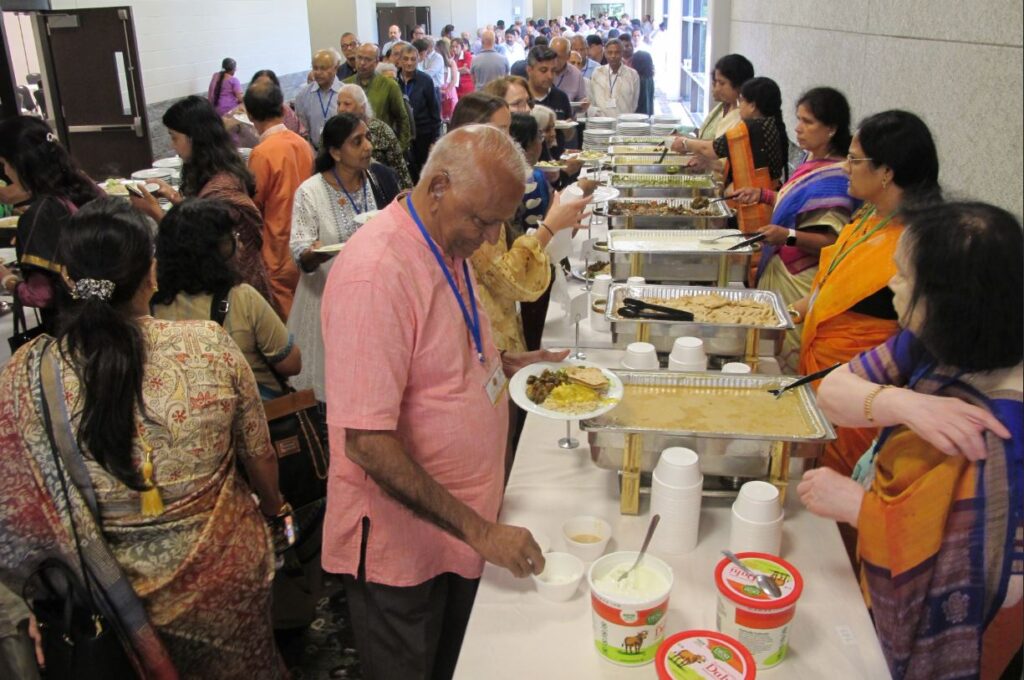
The Vedanta Societies in America in the United States established to support the work of the India-based Ramakrishna movement, these societies have played and continue to play a key role in the introduction of Hinduism in the West. They have been instrumental in spreading the teachings of Vedanta, the culmination of the Vedas, and have contributed to the rise of yoga in popularity. The societies focus on spiritual instruction and have been a magnet for intellectuals and artists who have drawn from Vedantic ideals. They have also been involved in social service and have resident monks and nuns in many centers. The Vedanta Societies have been a key player in the religious transfiguration of the American landscape, despite their small numbers compared to other religious movements in the West.
One of the key features of the conference was its focus on Vedantic philosophy’s relevance to modern life. Rather than being purely academic, the discussions were centered on spiritual growth, personal realization, and the path to liberation. By weaving in historical perspectives—such as the teachings of Chaitanya Mahaprabhu, Adi Sankara, Ramanuja, and Madhvacharya—the conference gave attendees a holistic understanding of Vedanta through the lenses of these great personalities.
Moreover, the inclusion of devotional practices like stotra recitals and meditation led by Swami Ishatmananda Ji infused the event with a strong spiritual atmosphere, helping to foster an even deeper connection with the teachings.
The NAVC 2025 was not just about intellectual discourse but also about personal transformation. It emphasized how the timeless wisdom of Vedanta can guide individuals on their spiritual journey towards enlightenment and liberation. Participants walked away with insights on how to integrate Vedantic teachings into daily life to cultivate peace, happiness, and spiritual unity.
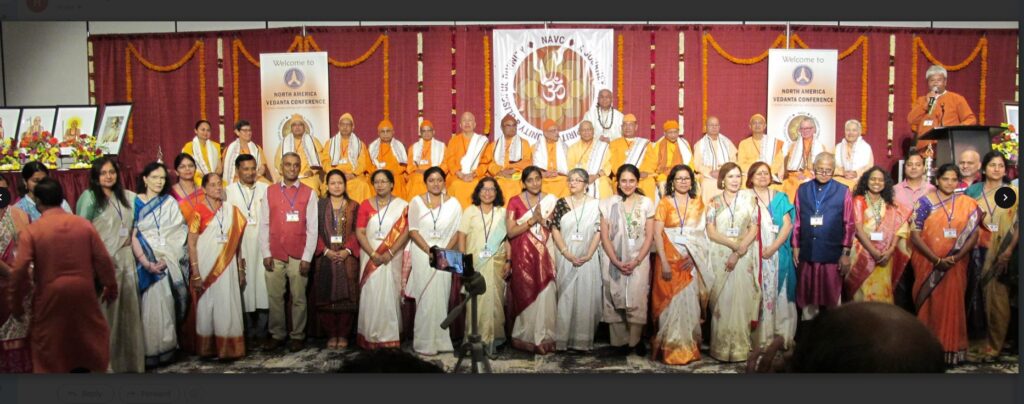
It was a true celebration of the Vedantic tradition and its global impact, a tradition that began with Swami Vivekananda’s introduction of Vedanta to America in 1893, and continues to evolve today through the efforts of monks and devotees across the world. The Vedanta Societies have been instrumental in spreading the teachings of Vedanta and supporting the rise of yoga in the West, while also being deeply involved in social service.
All in all, the NAVC served as a reminder of the power of Vedantic wisdom to transform lives, foster unity, and lead individuals on the path of spiritual realization.
Click the link below to see some memories that were captured during the conference weekend: https://photos.app.goo.gl/tF4wkuMh9Mvfj6E36



